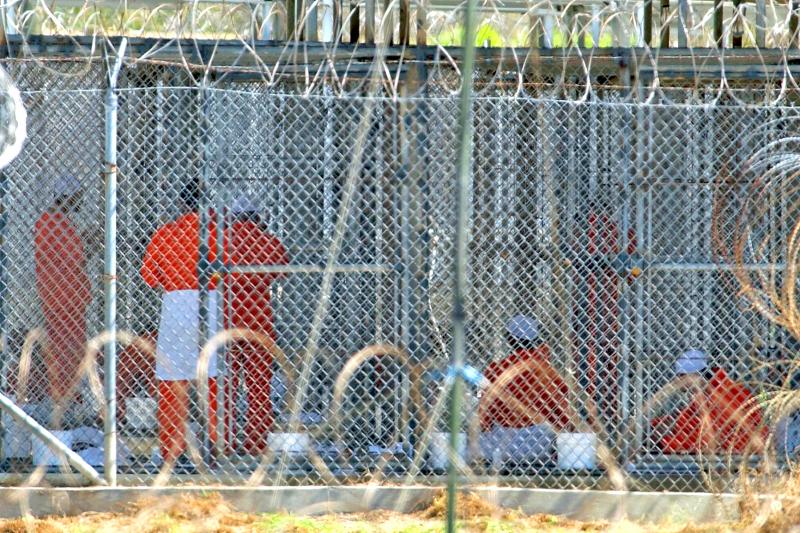Lithuania has paid 100,000 euros (US$113,377) to Abu Zubaydah, the Guantanamo detainee known as the “forever prisoner,” in compensation for having allowed the CIA to hold him at a secret site outside Vilnius where he was subjected to forms of torture.
The payment comes more than three years after the European Court of Human Rights ordered the Lithuanian government to pay compensation for violating European laws banning the use of torture.
HELD FOR 20 YEARS

Photo: AP
It marks a significant shift in the treatment of Zubaydah, who has been detained by the US without charge for more than 20 years.
Zubaydah was captured in Pakistan six months after Sept. 11, 2001. The CIA and lawyers for the administration of then-US president George W. Bush attempted to justify his torture by claiming he was a very senior figure in al-Qaeda. It emerged that he was not a member of the organization and he has never been charged with involvement in 9/11.
For much of the time since his arrest, Zubaydah has been held incommunicado, at the insistence of the CIA as part of its efforts to prevent details of his torture from becoming public.
In the past few months, there have been other signs of a shifting attitude toward Zubaydah and the torture that was inflicted upon him by CIA agents and contractors.
In October, the US Supreme Court heard arguments in a case in which the US government is seeking to block two CIA contractors from testifying in Poland about torture Zubaydah suffered in 2002 and 2003 at a secret, or “black,” site in that country.
In the course of the hearing, several of the justices, including conservatives, broke a legal taboo by openly using the word “torture.”
CODENAME VIOLET
In Zubaydah’s case against Lithuania, which was led on the European side by his lawyer, Helen Duffy, the European Court of Human Rights heard that Zubaydah was held at a CIA black site in that country from February 2005 to March 2006.
The site, codenamed Violet, was on the outskirts of Vilnius.
The most brutal forms of torture endured by Zubaydah occurred in 2002, when he was held at a CIA black site in Thailand.
An entire program of torture, euphemistically referred to by the CIA as “enhanced interrogation techniques,” was devised for the prisoner by two psychologists under contract to the agency.
Zubaydah was waterboarded — a type of controlled drowning — at least 83 times in August 2002, as well as being placed in a coffin-sized box for days on end.
European judges heard that Zubaydah was unlikely to have suffered from the harshest forms of torture while in Lithuania.
However, he was subjected to techniques that still amounted to torture, lawyers argued, including sensory and sleep deprivation, solitary confinement, loud noise and harsh light.
The money transferred by Lithuania is in a bank account. Zubaydah is unable to receive the sum given his detention in Guantanamo and because his assets have been frozen by the US Department of the Treasury.

MONEY GRAB: People were rushing to collect bills scattered on the ground after the plane transporting money crashed, which an official said hindered rescue efforts A cargo plane carrying money on Friday crashed near Bolivia’s capital, damaging about a dozen vehicles on highway, scattering bills on the ground and leaving at least 15 people dead and others injured, an official said. Bolivian Minister of Defense Marcelo Salinas said the Hercules C-130 plane was transporting newly printed Bolivian currency when it “landed and veered off the runway” at an airport in El Alto, a city adjacent to La Paz, before ending up in a nearby field. Firefighters managed to put out the flames that engulfed the aircraft. Fire chief Pavel Tovar said at least 15 people died, but

South Korea would soon no longer be one of the few countries where Google Maps does not work properly, after its security-conscious government reversed a two-decade stance to approve the export of high-precision map data to overseas servers. The approval was made “on the condition that strict security requirements are met,” the South Korean Ministry of Land, Infrastructure and Transport said. Those conditions include blurring military and other sensitive security-related facilities, as well as restricting longitude and latitude coordinates for South Korean territory on products such as Google Maps and Google Earth, it said. The decision is expected to hurt Naver and Kakao

LIKE FATHER, LIKE DAUGHTER: By showing Ju-ae’s ability to handle a weapon, the photos ‘suggest she is indeed receiving training as a successor,’ an academic said North Korea on Saturday released a rare image of leader Kim Jong-un’s teenage daughter firing a rifle at a shooting range, adding to speculation that she is being groomed as his successor. Kim’s daughter, Ju-ae, has long been seen as the next in line to rule the secretive, nuclear-armed state, and took part in a string of recent high-profile outings, including last week’s military parade marking the closing stages of North Korea’s key party congress. Pyongyang’s official Korean Central News Agency (KCNA) released a photo of Ju-ae shooting a rifle at an outdoor shooting range, peering through a rifle scope

Australian Prime Minister Anthony Albanese yesterday said he did not take his security for granted, after he was evacuated from his residence for several hours following a bomb threat sent to a Chinese dance group. Albanese was evacuated from his Canberra residence late on Tuesday following the threat, and returned a few hours later after nothing suspicious was found. The bomb scare was among several e-mails threatening Albanese sent to a representative of Shen Yun, a classical Chinese dance troupe banned in China that is due to perform in Australia this month, a spokesperson for the group said in a statement. The e-mail